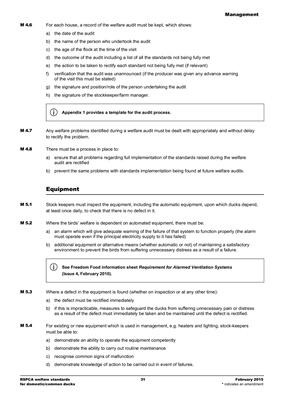
Management
RSPCA welfare standards
for domestic/common ducks
31 February 2015
* indicates an amendment
M 4.6 For each house, a record of the welfare audit must be kept, which shows:
a) the date of the audit
b) the name of the person who undertook the audit
c) the age of the flock at the time of the visit
d) the outcome of the audit including a list of all the standards not being fully met
e) the action to be taken to rectify each standard not being fully met (if relevant)
f) verification that the audit was unannounced (if the producer was given any advance warning
of the visit this must be stated)
g) the signature and position/role of the person undertaking the audit
h) the signature of the stockkeeper/farm manager.
Appendix 1 provides a template for the audit process.
M 4.7 Any welfare problems identified during a welfare audit must be dealt with appropriately and without delay
to rectify the problem.
M 4.8 There must be a process in place to:
a) ensure that all problems regarding full implementation of the standards raised during the welfare
audit are rectified
b) prevent the same problems with standards implementation being found at future welfare audits.
Equipment
M 5.1 Stock keepers must inspect the equipment, including the automatic equipment, upon which ducks depend,
at least once daily, to check that there is no defect in it.
M 5.2 Where the birds' welfare is dependent on automated equipment, there must be:
a) an alarm which will give adequate warning of the failure of that system to function properly (the alarm
must operate even if the principal electricity supply to it has failed)
b) additional equipment or alternative means (whether automatic or not) of maintaining a satisfactory
environment to prevent the birds from suffering unnecessary distress as a result of a failure.
See Freedom Food information sheet Requirement for Alarmed Ventilation Systems
(Issue 4, February 2010).
M 5.3 Where a defect in the equipment is found (whether on inspection or at any other time):
a) the defect must be rectified immediately
b) if this is impracticable, measures to safeguard the ducks from suffering unnecessary pain or distress
as a result of the defect must immediately be taken and be maintained until the defect is rectified.
M 5.4 For existing or new equipment which is used in management, e.g. heaters and lighting, stock-keepers
must be able to:
a) demonstrate an ability to operate the equipment competently
b) demonstrate the ability to carry out routine maintenance
c) recognise common signs of malfunction
d) demonstrate knowledge of action to be carried out in event of failures.